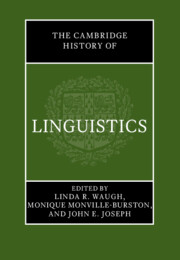Book contents
- The Cambridge History of Linguistics
- The Cambridge History of Linguistics
- Copyright page
- Dedication
- Contents
- Figures
- Tables
- Contributors
- Preface
- Acknowledgments
- Abbreviations, Acronyms, Special Symbols, and Other Conventions
- Introduction
- Part I Ancient, Classical, and Medieval Periods
- Part II Renaissance to Late Nineteenth Century
- Part III Late Nineteenth-through Twentieth-Century Linguistics
- Part IIIA Late Nineteenth Century through the 1950s: Synchrony, Autonomy, and Structuralism
- Part IIIB 1960–2000: Formalism, Cognitivism, Language Use and Function, Interdisciplinarity
- 17 Chomsky and the Turn to Syntax, Including Alternative Approaches to Syntax
- 18 Functionalist Dimensions of Grammatical and Discourse Analysis
- 19 Semantics and Pragmatics
- 20 Language and Philosophy, from Frege to the Present
- 21 Lexicology and Lexicography
- 22 Generative Phonology: its Origins, its Principles, and its Successors
- 23 Phonetics and Experimental Phonology, c. 1950–2000
- 24 Historical and Universal-Typological Linguistics
- 25 Language and Society
- 26 Language and Anthropology
- 27 Language and Psychology, 1950–Present: A Brief Overview
- 28 Semiotics
- 29 Applied Linguistics
- References
- Index
18 - Functionalist Dimensions of Grammatical and Discourse Analysis
from Part IIIB - 1960–2000: Formalism, Cognitivism, Language Use and Function, Interdisciplinarity
Published online by Cambridge University Press: 20 July 2023
- The Cambridge History of Linguistics
- The Cambridge History of Linguistics
- Copyright page
- Dedication
- Contents
- Figures
- Tables
- Contributors
- Preface
- Acknowledgments
- Abbreviations, Acronyms, Special Symbols, and Other Conventions
- Introduction
- Part I Ancient, Classical, and Medieval Periods
- Part II Renaissance to Late Nineteenth Century
- Part III Late Nineteenth-through Twentieth-Century Linguistics
- Part IIIA Late Nineteenth Century through the 1950s: Synchrony, Autonomy, and Structuralism
- Part IIIB 1960–2000: Formalism, Cognitivism, Language Use and Function, Interdisciplinarity
- 17 Chomsky and the Turn to Syntax, Including Alternative Approaches to Syntax
- 18 Functionalist Dimensions of Grammatical and Discourse Analysis
- 19 Semantics and Pragmatics
- 20 Language and Philosophy, from Frege to the Present
- 21 Lexicology and Lexicography
- 22 Generative Phonology: its Origins, its Principles, and its Successors
- 23 Phonetics and Experimental Phonology, c. 1950–2000
- 24 Historical and Universal-Typological Linguistics
- 25 Language and Society
- 26 Language and Anthropology
- 27 Language and Psychology, 1950–Present: A Brief Overview
- 28 Semiotics
- 29 Applied Linguistics
- References
- Index
Summary
This three-authored chapter discusses multiple function-oriented and context-based approaches to grammar, discourse/talk and text, which gave primacy to communication, meaning, actual language use, pragmatic patterning, social and cultural issues, and/or human cognition. (New) theoretical constructs, (various) themes, (different) methodologies and data, came from functional, cognitive, critical, systemic and enunciative linguistics and sociolinguistics, as well as speech act theory, pragmatics, ethnography, anthropology, argumentation theory, social semiotics, multimodal studies, sociology, (socio)cultural and critical studies. Language was analyzed as a (spoken and written) tool, a social practice, a collective process and product, whose forms (words, expressions, clauses, sentences/utterances, discourses/text, talk and interaction) are largely explained by their multiple communicative functions, patterns of use, and social, cultural and cognitive correlates.
The topics touched on include: models of communication, situation of interaction, speaker’s vs. hearer’s perspective, referential, social and expressive meaning, iconic principles in language, politeness, social identity and power. Approaches include: speech act theory, Gricean pragmatics, ethnography of communication (Gumperz and Hymes), analysis of oral narrative (Labov), functional grammar (Dik), functional discourse grammar (Rijkhoff), discourse representation theory (Kamp), systemic functional grammar (Halliday), discourse dependent grammar (Hopper and Thompson), emergent grammar (Hopper), grammaticalization, functional-cognitive grammar (Langacker), text linguistics, enunciation theory, and critical discourse analysis.
Keywords
- Type
- Chapter
- Information
- The Cambridge History of Linguistics , pp. 577 - 617Publisher: Cambridge University PressPrint publication year: 2023

